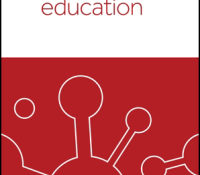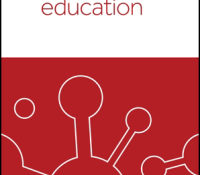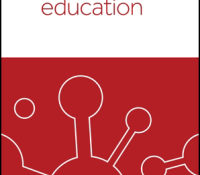tandfonline.com har udgivet en rapport under søgningen “Teacher Education Mathematics”: Abstract Formulae display:?Mathematical formulae have been encoded as MathML and are displayed in this HTML version using MathJax in order to improve their display. Uncheck the box to turn MathJax off. This feature requires Javascript. Click on a formula to zoom. Abstract Drawing on Critical Friendship as a theoretical base, an investigation was carried out to find out what components of teacher-student relationship would make a difference in the performance in mathematics of the eleventh graders in the Cape Coast Metropolis. A sample size of 2,575 students was randomly chosen to fill a questionnaire on teacher-student relationship and write an achievement test in mathematics. Findings revealed that trust, fear and lack of respect negligibly and statistically correlated with achievement scores;… Continue Reading →
Like this:
Like Loading...
eric.ed.gov har udgivet: The present study, which was drawn from a larger project in which teachers developed and implemented performance assessments in their classrooms, investigates children’s perceptions of what reading and mathematics are and how they understand their teachers’ knowledge of them as readers and mathematicians. Two students from each of 13 third-grade classrooms were interviewed 3 times during the school year. In all, 75 interviews about reading and 76 about mathematics were conducted. Responses make it clear that students do recognize reading as a meaning-making task but that this recognition becomes distorted when they are assessed on their reading ability. They believe that assessment is often aimed at handwriting, punctuation, or expression when reading aloud. In mathematics, these students demonstrate consistency across definition of math and assessment of math.… Continue Reading →
Like this:
Like Loading...
eric.ed.gov har udgivet: The purpose of this large-scale, national study is to determine whether some early elementary school math curricula are more effective than others at improving student math achievement, thereby providing educators with information that may be useful for making adequate yearly progress (AYP). This report presents results from the first cohort of first grade in 39 schools participating in the evaluation during the 2006-2007 school year, with the goal of determining the relative effects of different early elementary math curricula on student math achievement in disadvantaged schools. The report also examines whether curriculum effects differ for student subgroups in different instructional settings. A competitive process was used to select four curricula Investigations in Number, Data, and Space; Math Expressions; Saxon Math; and Scott Foresman-Addison Wesley Mathematics) that represent… Continue Reading →
Like this:
Like Loading...
eric.ed.gov har udgivet: National achievement data show that elementary school students in the United States, particularly those from low socioeconomic backgrounds, have weak math skills (National Center for Education Statistics 2009). In fact, data show that, even before they enter elementary school, children from disadvantaged backgrounds are behind their more advantaged peers in basic competencies such as number-line ordering and magnitude comparison (Rathburn and West 2004). Furthermore, after a year of kindergarten, disadvantaged students still have less extensive knowledge of mathematics than their more affluent peers (Denton and West 2002). This study examines whether some early elementary school math curricula are more effective than others at improving student math achievement in disadvantaged schools. A small number of curricula, which are based on different approaches for developing student math skills, dominate… Continue Reading →
Like this:
Like Loading...
eric.ed.gov har udgivet: The purpose of this large-scale, national study is to determine whether some early elementary school math curricula are more effective than others at improving student math achievement, thereby providing educators with information that may be useful for making adequate yearly progress (AYP). This report presents results from the first cohort of first grade in 39 schools participating in the evaluation during the 2006-2007 school year, with the goal of determining the relative effects of different early elementary math curricula on student math achievement in disadvantaged schools. The report also examines whether curriculum effects differ for student subgroups in different instructional settings. A competitive process was used to select four curricula Investigations in Number, Data, and Space; Math Expressions; Saxon Math; and Scott Foresman-Addison Wesley Mathematics) that represent… Continue Reading →
Like this:
Like Loading...
eric.ed.gov har udgivet: National achievement data show that elementary school students in the United States, particularly those from low socioeconomic backgrounds, have weak math skills (National Center for Education Statistics 2009). In fact, data show that, even before they enter elementary school, children from disadvantaged backgrounds are behind their more advantaged peers in basic competencies such as number-line ordering and magnitude comparison (Rathburn and West 2004). Furthermore, after a year of kindergarten, disadvantaged students still have less extensive knowledge of mathematics than their more affluent peers (Denton and West 2002). This study examines whether some early elementary school math curricula are more effective than others at improving student math achievement in disadvantaged schools. A small number of curricula, which are based on different approaches for developing student math skills, dominate… Continue Reading →
Like this:
Like Loading...

tandfonline.com har udgivet en rapport under søgningen “Teacher Education Mathematics”: Abstract Abstract In third grade the focus on math word problems becomes prominent. In the limited third grade research, teacher-mediated explicit instruction with multiple exemplars, teaching students to use visual representations, and the incorporation of self-strategies, have proven effective. For these practices to reach their full potential though, their content must be relevant and provide for growth to mature mathematical concepts. Based on these conclusions, additional research was needed. Therefore, the focus of this study was to evaluate the effectiveness of a multi-component word problem-solving intervention with explicit instruction strategies, multiple exemplars, the teaching of student-generated visual representations, incorporation of a self-monitoring checklist, and Common Core State Standards’ appropriate curriculum. Within a multiple baseline across behaviors design, the study evaluated… Continue Reading →
Like this:
Like Loading...
tandfonline.com har udgivet en rapport under søgningen “Teacher Education Mathematics”: Abstract Formulae display:?Mathematical formulae have been encoded as MathML and are displayed in this HTML version using MathJax in order to improve their display. Uncheck the box to turn MathJax off. This feature requires Javascript. Click on a formula to zoom. Abstract The purpose of this study was to examine fifth graders’ mathematical reasoning and spatial ability, to identify a correlation with their learning styles, and to determine the predictive power of their learning styles on their mathematical learning profiles. This causal study was conducted with 97 fifth graders (60 females, 61.9% and 37 males, 38.1%). The data were collected using three instruments: the Test on Learning Styles, the Mathematical Reasoning Test, and the Spatial Ability Test. Considering the combined… Continue Reading →
Like this:
Like Loading...
eric.ed.gov har udgivet: As education continues to progress schools are constantly seeking innovative ways to cultivate and enhance achievement for all students. As a result many public schools are pushing toward the inclusion model. This model includes co-taught instruction to meet the many needs of special education students. This research study was implemented to investigate the comparative effects of co-teaching versus solo-teaching on student’s math achievement in elementary school. Study participants included two fourth grade classes in an elementary school, one with a regular education (solo-teaching) and the other with the same regular education teacher and a special education teacher for the co-taught class. The independent variable is the teaching arrangement (co taught class vs. a solo-taught class) as considered by the school system and the dependent variable is the… Continue Reading →
Like this:
Like Loading...
eric.ed.gov har udgivet: The purpose of the present study was to test the efficacy of a modified cognitive strategy instructional intervention originally developed to improve the mathematical problem solving of middle and high school students with learning disabilities (LD). Fifth and sixth grade general education mathematics teachers and their students of varying ability (i.e., average-achieving [AA] students, low-achieving [LA] students, and students with LD) participated in the research study. Several features of the intervention were modified, including (a) explicitness of instruction, (b) emphasis on meta-cognition, (c) focus on problem-solving prerequisites, (d) extended duration of initial intervention, and (e) addition of visual supports. General education math teachers taught all instructional sessions to their inclusive classrooms. Curriculum-based measures (CBMs) of math problem solving were administered five times over the course of the… Continue Reading →
Like this:
Like Loading...


